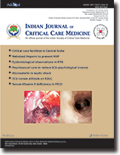
Indian Journal of Critical Care Medicine
Scope & Guideline
Innovating Practices, Transforming Patient Care
Introduction
Aims and Scopes
- Critical Care Practices:
The journal emphasizes the dissemination of current best practices in critical care, including protocols for managing various conditions such as sepsis, respiratory failure, and acute kidney injury. - Innovative Treatment Modalities:
Research on novel treatment approaches, including the use of advanced technologies like extracorporeal membrane oxygenation (ECMO), high-flow nasal cannula, and non-invasive ventilation methods. - Outcomes Research:
A focus on clinical outcomes, including mortality predictors, quality of life post-discharge, and long-term effects of critical illness, especially in relation to COVID-19. - Interdisciplinary Collaboration:
The journal highlights studies that involve collaboration across different medical specialties, enhancing comprehensive care for critically ill patients. - Ethical and Medicolegal Aspects:
Research addressing the ethical dilemmas and legal considerations in intensive care settings, particularly concerning end-of-life care and informed consent.
Trending and Emerging
- COVID-19 Related Research:
A significant increase in studies related to COVID-19, addressing its impact on critical care practices, outcomes, and long-term effects on survivors. - Telemedicine and Remote Monitoring:
Emerging interest in the use of telemedicine and remote monitoring technologies to enhance patient management in critical care settings, especially during the pandemic. - Antimicrobial Stewardship:
Growing emphasis on research related to antimicrobial resistance, stewardship programs, and the effectiveness of different antibiotic regimens in critical care. - Psychological Well-being of Healthcare Workers:
An increasing focus on the mental health and well-being of healthcare providers in high-stress environments, particularly in the context of the COVID-19 pandemic. - Personalized Medicine in Critical Care:
A trend towards personalized treatment strategies based on individual patient characteristics, including the use of biomarkers and tailored interventions.
Declining or Waning
- Traditional Diagnostic Approaches:
There is a noticeable decline in research focused on conventional diagnostic methods, as newer technologies and biomarkers gain prominence in critical care assessment. - Static Protocols for Patient Management:
Research centered around rigid, traditional management protocols is less frequent, with a shift towards more flexible, individualized care approaches being favored. - Basic Resuscitation Techniques:
The volume of studies dedicated to foundational resuscitation techniques appears to be decreasing, possibly due to an increased focus on advanced interventions and technology.
Similar Journals
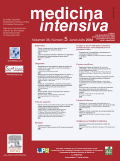
Medicina Intensiva
Shaping the Future of Critical Care, One Article at a TimeMedicina Intensiva is a distinguished journal published by Elsevier España SLU, specializing in the critical care and intensive medicine fields. Since its inception in 1988, this peer-reviewed journal has established itself as a vital resource for healthcare professionals and researchers dedicated to advancing the knowledge and treatment of critically ill patients. With an impact factor ranked in the Q2 category for Critical Care and Intensive Care Medicine, the journal sits at the 50th percentile among its peers, reflecting its reputable standing in the academic community. The scope of the journal encompasses a wide array of topics, from clinical practices to innovative research findings, contributing significantly to the enhancement of patient care in intensive settings. Although the journal does not currently offer Open Access options, its valuable content is accessible to subscribers and institutions, reinforcing its role as an important conduit for disseminating high-quality research. As we continue into 2024, *Medicina Intensiva* remains committed to supporting the medical community through insightful articles and timely reviews that shape the future of intensive care.

Anesteziologie a Intenzivni Medicina
Bridging Research and Practice in Intensive MedicineAnesteziologie a Intenzivni Medicina is a pivotal Czech journal dedicated to the fields of anesthesiology, critical care, and intensive medicine. Published by SOLEN SRO, this journal plays a crucial role in disseminating essential research and advancements in these vital areas of medicine. With the ISSN 1214-2158 and E-ISSN 1805-4412, it has been in publication since 2003, showcasing a wealth of knowledge that is particularly relevant to the clinical practices in the Czech Republic and beyond. Although currently classified in the Q4 quartile for both anesthesiology and critical care disciplines, the journal is committed to fostering high-quality research and clinical discussions. Researchers and healthcare professionals can benefit from its content that encompasses various aspects of patient care and procedural developments. This journal is a valuable resource for those aiming to stay updated within the fast-evolving landscape of anesthesiology and intensive medicine, despite its limited open access options. As it progresses towards its 2024 convergence year, Anesteziologie a Intenzivni Medicina strives to elevate its impact and relevance in the medical community.

Medizinische Klinik-Intensivmedizin und Notfallmedizin
Innovative Insights in Intensive and Emergency MedicineMedizinische Klinik-Intensivmedizin und Notfallmedizin, published by SPRINGER HEIDELBERG, is a distinguished journal that serves the fields of critical care, intensive care medicine, emergency medicine, and internal medicine. With an ISSN of 2193-6218 and an E-ISSN of 2193-6226, the journal has established its presence in Germany and has garnered respect within the international medical community. It has demonstrated noteworthy impact, classified in the Q2 and Q3 quartiles across various categories in 2023, including Critical Care and Intensive Care Medicine, Emergency Medicine, and Emergency Nursing. This journal not only showcases cutting-edge research but also offers a platform for sharing innovative practices and clinical developments, thereby facilitating improved patient care and outcomes. As an accessible resource for researchers, professionals, and students dedicated to advancing their knowledge in acute and critical care settings, the journal represents an essential addition to the scholarly landscape in its field.
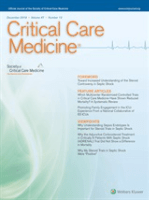
CRITICAL CARE MEDICINE
Advancing Critical Insights for Lifesaving CareCRITICAL CARE MEDICINE is a premier journal dedicated to the advancement of knowledge and practice in the field of critical care and intensive care medicine. Published by Lippincott Williams & Wilkins, this distinguished journal has been at the forefront of medical research since its inception in 1973, and it continues to offer insights into the latest developments and innovations in critical care. With a remarkable ranking of #5 out of 110 in Scopus' Critical Care category and a 95th percentile rating, CRITICAL CARE MEDICINE is a leading source for high-impact research, reviews, and clinical studies. The journal is recognized as a Q1 publication, underscoring its authoritative presence within the academic community. Researchers and clinicians are encouraged to engage with cutting-edge findings that aim to improve patient care and outcomes. Although the journal is not open access, it remains an essential resource for professionals seeking to enhance their understanding and application of critical care practices.

PERFUSION-UK
Transforming Patient Care Through Cutting-Edge ResearchPERFUSION-UK is a distinguished academic journal published by SAGE Publications Ltd, focusing on advanced topics in the fields of nursing, cardiology, and radiology, among others. With an ISSN of 0267-6591 and an E-ISSN of 1477-111X, this journal serves as a crucial platform for disseminating vital research and innovative practices in both theoretical and applied aspects of perfusion science. Operating from the United Kingdom, it has an impressive history, converging years from 1986 to 2024. In the 2023 category quartiles, it has secured a Q2 ranking in Advanced and Specialized Nursing, revealing its strong reputation in the nursing community, while also ranking Q3 in cardiology and other medical specialties, which highlights its multidisciplinary significance. With a commendable Scopus ranking positioning it favorably among its peers, PERFUSION-UK is committed to providing researchers, professionals, and students access to cutting-edge studies and practices, ultimately aiming to enhance patient care and safety in clinical settings.
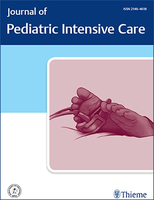
Journal of Pediatric Intensive Care
Bridging research and practice for critically ill children.Journal of Pediatric Intensive Care, published by GEORG THIEME VERLAG KG, is a vital resource in the field of pediatric healthcare, focusing specifically on intensive care practices and advancements. With the ISSN 2146-4618 and E-ISSN 2146-4626, this journal aims to bridge the gap between research and clinical practice, providing a platform for the dissemination of high-quality articles that explore cutting-edge techniques, innovative treatments, and the latest developments in pediatric critical care. Although the journal had its coverage in Scopus between the years 2012 to 2013, it continues to play an essential role for researchers, healthcare professionals, and students striving to improve outcomes for critically ill children. Triaging the complexities inherent in pediatric care, the journal welcomes submissions that contribute to the ongoing dialogue within the intensive care community, ensuring that each article serves to inform, educate, and enhance pediatric intensive care practices globally.
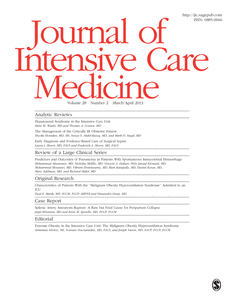
JOURNAL OF INTENSIVE CARE MEDICINE
Shaping the Future of Critical CareJOURNAL OF INTENSIVE CARE MEDICINE, published by SAGE PUBLICATIONS INC, is a leading peer-reviewed journal dedicated to advancing the field of critical care and intensive medicine. With an ISSN of 0885-0666 and an E-ISSN of 1525-1489, this esteemed journal showcases innovative research, clinical practices, and synthesis of knowledge that informs the complexities of patient care in intensive settings. Recognized for its exceptional impact, it holds a prestigious Q1 ranking in the Critical Care and Intensive Care Medicine category, landing in the upper 15% of its field according to Scopus rankings. Celebrating over three decades of publication since its inception in 1986, the journal serves both as a resource for seasoned professionals and a platform for emerging researchers eager to contribute to evidence-based practice. Although not open access, the journal ensures that critical insights and advancements are accessible to a broad audience, fostering a collaborative environment that is essential for the evolution of intensive care protocols and the enhancement of patient outcomes. With its commitment to excellence, the JOURNAL OF INTENSIVE CARE MEDICINE stands out as an invaluable resource that continues to shape the future of healthcare in critical domains.
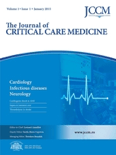
Journal of Critical Care Medicine
Enhancing clinical practices with impactful research.The Journal of Critical Care Medicine, published by SCIENTO, is a pioneering open-access journal dedicated to advancing the field of critical care, emergency medicine, anesthesiology, and pulmonary medicine. Since its inception in 2015, this journal has made significant strides in fostering knowledge dissemination and scholarly communication within the medical community. With an ISSN of 2393-1809 and an E-ISSN of 2393-1817, it provides a platform for high-quality research that impacts clinical practices and improves patient outcomes. Currently ranked in the second and third quartiles across multiple categories such as Critical Care and Intensive Care Medicine, and Emergency Medicine, the journal’s impact is underlined by its inclusion in prestigious databases like Scopus. The journal’s commitment to open-access publishing ensures that vital research is accessible to a wider audience, enriching the global dialogue in critical care practices. Researchers, healthcare professionals, and students seeking to remain at the forefront of this rapidly evolving field will find an invaluable resource in the Journal of Critical Care Medicine.
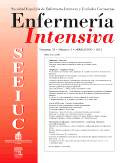
Enfermeria Intensiva
Bridging Research and Practice in Intensive NursingEnfermeria Intensiva, published by Elsevier Science Inc, is a highly regarded journal in the fields of Advanced and Specialized Nursing as well as Critical Care and Intensive Care Medicine. With an impressive track record spanning from 1994 to 2024, this journal serves as a vital resource for researchers, healthcare professionals, and students dedicated to enhancing the quality of patient care in critical settings. It holds a coveted Q2 ranking in multiple nursing categories as of 2023, reflecting its influence and contribution to the ongoing discourse in nursing practices. Although currently not an open access journal, it continues to provide intricate insights into both fundamental skills and specialized techniques essential in intensive nursing care. By bridging research and practical application, Enfermeria Intensiva plays a pivotal role in advancing knowledge and improving outcomes in critical care environments.
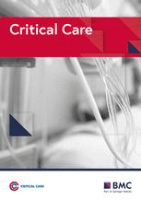
CRITICAL CARE
Empowering healthcare through innovative insights.CRITICAL CARE is an esteemed peer-reviewed journal dedicated to advancing the field of critical care and intensive medicine, published by BMC. Since its inception in 1998, it has been a prominent open-access platform that allows for the dissemination of high-quality research, fostering collaboration among researchers, healthcare professionals, and students globally. With a notable impact factor and ranking in the top quartile (Q1) of critical care and intensive care medicine, CRITICAL CARE occupies a vital role in disseminating cutting-edge findings and innovative practices that can significantly enhance patient outcomes in critical care settings. The journal not only encourages submissions of original research, clinical trials, and reviews but also emphasizes the importance of interdisciplinary approaches to critical care management. Positioned in the United Kingdom, CRITICAL CARE's commitment to open access ensures that its valuable content is readily available to a worldwide audience, reflecting its mission to bridge knowledge gaps and empower professionals in the pursuit of excellence in critical healthcare.